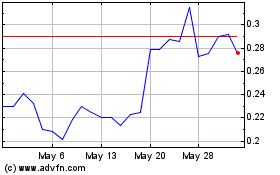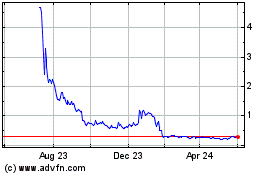60 Degrees Pharmaceuticals, Inc. (the “Company,” “60P” or “60
Degrees Pharmaceuticals”) (NASDAQ: SXTP; SXTPW), specialists in
developing and marketing medicines for infectious diseases, today
announced it will, through its majority-owned subsidiary 60P
Australia Pty Ltd, sponsor a series of animal studies to
investigate whether single dose parenteral administration of
tafenoquine exhibits efficacy against Candida spp,
including Candida auris (C. auris). C. auris, a strain of fungal
yeast, is an emerging pathogen that poses risk of serious infection
in the bloodstream and elsewhere, especially in hospitalized
patients.
The study will be conducted by Monash University in Melbourne,
Australia, beginning in the second quarter of 2024. Results are
expected by the end of 2024.
Tafenoquine is the active ingredient in an
anti-malarial approved by the U.S. Food and Drug Administration
(FDA) in 2018 and is indicated for the prophylaxis of malaria in
patients aged 18 years of age and older.
“The rapid transmission of Candida auris in healthcare
facilities is a very real threat and the need for a safe,
effective treatment option is becoming more urgent every day,” said
60 Degrees Pharmaceuticals Chief Executive Officer and President,
Geoff Dow. “This important study could certainly yield valuable
insights into how tafenoquine may be used toward
that end. We are pleased to serve as the study sponsor working with
Monash University and look forward to reviewing results in coming
months.”
“It is well known that Candida auris can cause severe
illness in hospitalized patients,” said Professor Anton Peleg, a
Professor at Central Clinical School, Monash University, and the
principal investigator for the studies. “Even more concerning is
the fact that many strains of this fungal infection are now
completely resistant to currently available therapies. We are
optimistic that the results of our study using
tafenoquine will point the way toward development
of a new treatment to address this clear, unmet medical need.”
The journal, New Microbes and New Infections recently published
non-clinical study results showing tafenoquine
exhibits broad spectrum antifungal activity against several species
of Candida, including C. auris, within in vitro broth culture. That
research was funded by the National Institute of Allergy and
Infectious Diseases (NIAID), part of the National Institutes of
Health (NIH).
Like other 8-aminoquinoline antimalarials,
tafenoquine is expected to kill fungi by
disrupting cellular responses to oxidative stress, differentiating
it from other antifungals.
About Candida auris
Candida auris (C. auris) is an emerging fungus that
presents a serious global health threat, according to the Centers
for Disease Control and Prevention (CDC). C. auris is often
multi-drug-resistant, meaning that it is resistant to multiple
antifungal drugs commonly used to
treat Candida infections.
C. auris carries a high mortality rate, killing more than 1
in 3 people with infections. Infections often emerge in healthcare
settings, where people are particularly vulnerable. Rates are
rising; the CDC reports annual cases of C. auris in the United
States have risen from fewer than 500 in 2019 to nearly 1,500 in
2023.
About ARAKODA®
(tafenoquine)
Tafenoquine was discovered by Walter Reed Army
Institute of Research. Tafenoquine was approved
for malaria prophylaxis in 2018 in the United States as ARAKODA®
and in Australia as KODATEF®. Both were commercially launched in
2019 and are currently distributed through pharmaceutical
wholesaler networks in each respective country. They are available
at retail pharmacies as a prescription-only malaria prevention
drug.
According to the Centers for Disease Control and Prevention, the
long terminal half-life of tafenoquine, which is
approximately 16 days, may offer potential advantages in less
frequent dosing for prophylaxis for malaria. ARAKODA is not
suitable for everyone, and patients and prescribers should review
the Important Safety Information below.
Neither ARAKODA nor tafenoquine has been
approved by the FDA for treatment or prevention of fungal
infections.
ARAKODA® (tafenoquine)
Important Safety Information
ARAKODA® is an
antimalarial indicated for the prophylaxis of malaria in patients
aged 18 years of age and older.
ContraindicationsARAKODA should
not be administered to:
- Patients with Glucose-6-phosphate dehydrogenase (G6PD)
deficiency or unknown G6PD status.
- Lactating women who are breastfeeding when the infant is found
to be G6PD deficient or if G6PD status is unknown.
- Patients with a history of psychotic disorders or current
psychotic symptoms.
- Patients with known hypersensitivity reactions to tafenoquine,
other 8-aminoquinolines, or any component
of ARAKODA.
Warnings and Precautions
- Hemolytic Anemia: G6PD testing must be
performed before prescribing ARAKODA due
to the risk of hemolytic anemia. Monitor patients for signs or
symptoms of hemolysis.
- G6PD Deficiency in Pregnancy or
Lactation: ARAKODA may cause
fetal harm when administered to a pregnant woman with a
G6PD-deficient fetus. ARAKODA is not
recommended during pregnancy. A G6PD-deficient infant may be at
risk for hemolytic anemia from exposure
to ARAKODA through breast milk. Check
infant's G6PD status before breastfeeding begins.
- Methemoglobinemia: Asymptomatic elevations in
blood methemoglobin have been observed. Initiate appropriate
therapy if signs or symptoms of methemoglobinemia occur.
- Psychiatric Effects: Serious psychotic adverse
reactions have been observed in patients with a history of
psychosis or schizophrenia, at doses different from the approved
dose. If psychotic symptoms (hallucinations, delusions, or grossly
disorganized thinking or behavior) occur, consider discontinuation
of ARAKODA therapy and evaluation by a
mental health professional as soon as possible.
- Hypersensitivity Reactions: Serious
hypersensitivity reactions have been observed with administration
of ARAKODA. If hypersensitivity reactions
occur, institute appropriate therapy.
- Delayed Adverse Reactions: Due to the long
half-life of ARAKODA, (approximately 17
days), psychiatric effects, hemolytic anemia, methemoglobinemia,
and hypersensitivity reactions may be delayed in onset and/or
duration.
Adverse Reactions: The most common adverse
reactions (incidence greater than or equal to 1 percent) were:
headache, dizziness, back pain, diarrhea, nausea, vomiting,
increased alanine aminotransferase, motion sickness, insomnia,
depression, abnormal dreams, and anxiety.
Drug InteractionsAvoid co-administration with
drugs that are substrates of organic cation transporter-2 or
multidrug and toxin extrusion transporters.
Use in Specific Populations Lactation:
Advise women not to breastfeed a G6PD-deficient infant or infant
with unknown G6PD status during treatment and for 3 months after
the last dose of ARAKODA.
To report SUSPECTED ADVERSE REACTIONS, contact 60 Degrees
Pharmaceuticals at 1- 888-834-0225 or FDA at 1-800-FDA-1088
or www.fda.gov/medwatch. ARAKODA full
prescribing information is here.
About 60 Degrees Pharmaceuticals, Inc.60
Degrees Pharmaceuticals, Inc., founded in 2010, specializes in
developing and marketing new medicines for the treatment and
prevention of infectious diseases that affect the lives of millions
of people. 60 Degrees Pharmaceuticals achieved FDA approval of its
lead product, ARAKODA® (tafenoquine) for malaria prevention, in
2018. 60 Degrees Pharmaceuticals also collaborates with prominent
research organizations in the U.S., Australia and Singapore. The 60
Degrees Pharmaceuticals mission has been supported through in-kind
funding from the United States Department of Defense and private
institutional investors including Knight Therapeutics Inc., a
Canadian-based pan-American specialty pharmaceutical company. 60
Degrees Pharmaceuticals is headquartered in Washington D.C., with a
majority-owned subsidiary in Australia. Learn more at
www.60degreespharma.com.
Cautionary Note Regarding Forward-Looking
StatementsThis press release may contain “forward-looking
statements” within the meaning of the safe harbor provisions of the
U.S. Private Securities Litigation Reform Act of 1995.
Forward‐looking statements reflect the current view about future
events. When used in this press release, the words “anticipate,”
“believe,” “estimate,” “expect,” “future,” “intend,” “plan,” or the
negative of these terms and similar expressions, as they relate to
us or our management, identify forward‐looking statements.
Forward-looking statements are neither historical facts nor
assurances of future performance. Instead, they are based only on
our current beliefs, expectations and assumptions regarding the
future of our business, future plans and strategies, projections,
anticipated events and trends, the economy and other future
conditions. Because forward-looking statements relate to the
future, they are subject to inherent uncertainties, risks and
changes in circumstances that are difficult to predict and many of
which are outside of our control. Our actual results and financial
condition may differ materially from those indicated in the
forward-looking statements. Therefore, you should not rely on any
of these forward-looking statements. Important factors that could
cause our actual results and financial condition to differ
materially from those indicated in the forward-looking statements
include, among others, the following: there is substantial doubt as
to our ability to continue on a going-concern basis; we might not
be eligible for Australian government research and development tax
rebates; if we are not able to successfully develop, obtain FDA
approval for, and provide for the commercialization of non-malaria
prevention indications for tafenoquine (ARAKODA® or other regimen)
or Celgosivir in a timely manner, we may not be able to expand our
business operations; we may not be able to successfully conduct
planned clinical trials; and we have no manufacturing capacity
which puts us at risk of lengthy and costly delays of bringing our
products to market. More detailed information about the
Company and the risk factors that may affect the realization of
forward-looking statements is set forth in the Company’s filings
with the Securities and Exchange Commission (SEC),
including our Annual Report on Form 10-K and our subsequent
Quarterly Reports on Form 10-Q. Investors and security holders are
urged to read these documents free of charge on the SEC’s web site
at www.sec.gov. As a result of these matters, changes in
facts, assumptions not being realized or other circumstances, the
Company’s actual results may differ materially from the expected
results discussed in the forward-looking statements contained in
this press release. Any forward-looking statement made by us in
this press release is based only on information currently available
to us and speaks only as of the date on which it is made. We
undertake no obligation to publicly update any forward-looking
statement, whether written or oral, that may be made from time to
time, whether as a result of new information, future developments
or otherwise.
Media Contacts:Sheila A.
BurkeSheilaBurke-consultant@60degreespharma.com(484) 667-6330
Investor Contact:Patrick
Gaynespatrickgaynes@60degreespharma.com(310) 989-5666
60 Degrees Pharmaceuticals (NASDAQ:SXTP)
Historical Stock Chart
From Dec 2024 to Jan 2025

60 Degrees Pharmaceuticals (NASDAQ:SXTP)
Historical Stock Chart
From Jan 2024 to Jan 2025
